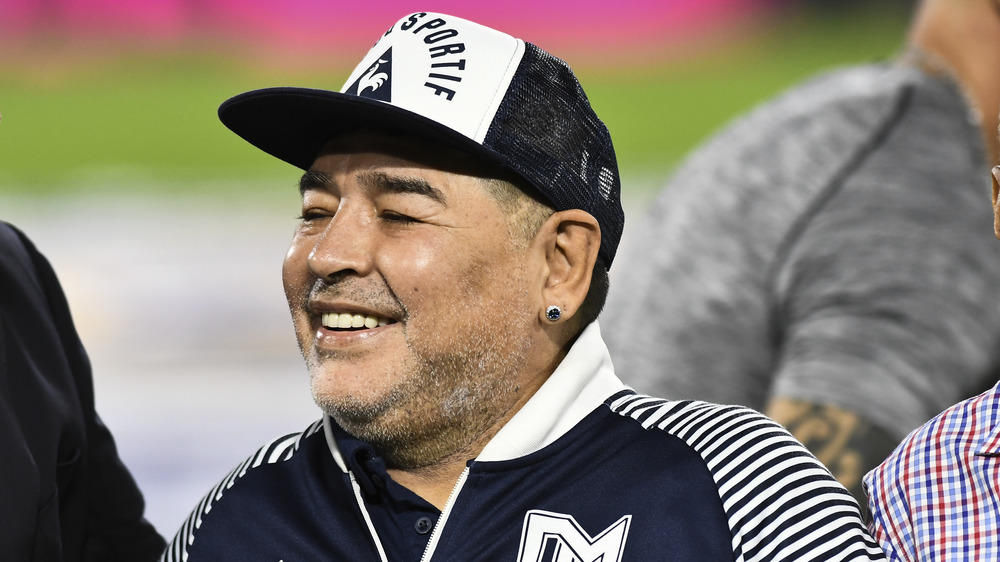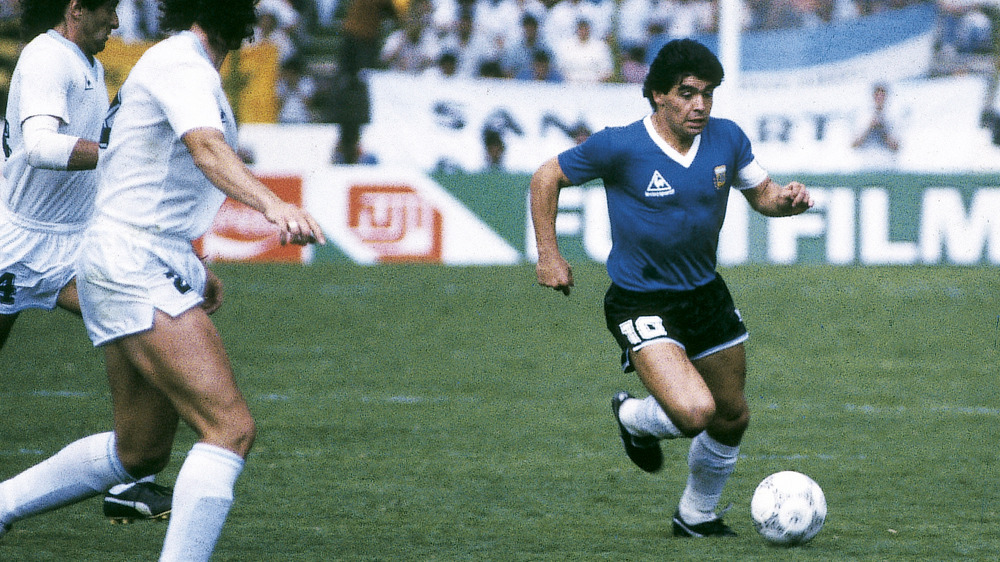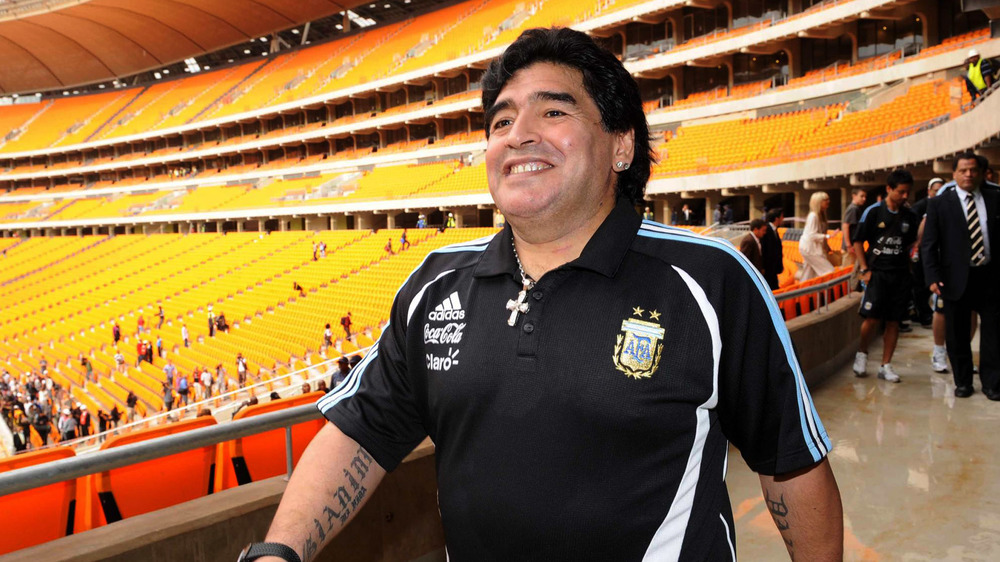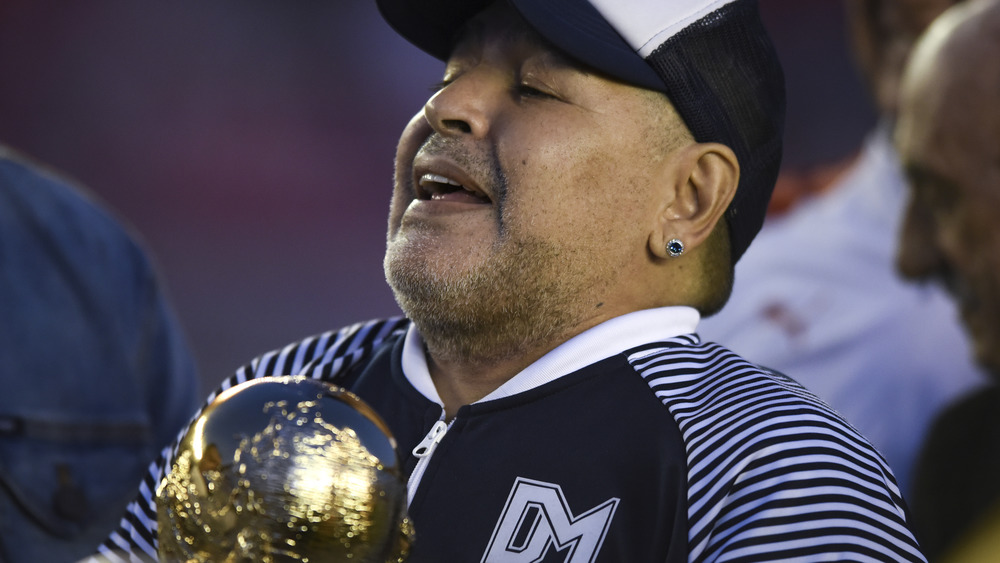The Tragic Death Of Diego Maradona
Diego Maradona, often considered one of the greatest soccer players to have ever lived, has died at age 60. The Guardian reported that the athlete suffered a fatal heart attack after undergoing brain surgery earlier in November 2020.
The athlete is best known globally for his role on the Argentine soccer team as team captain during the 1986 World Cup. In the quarterfinal match against England, Maradona scored one of the game-winning goals, which came to be famously known as the "Hand of God" and as one of the greatest goals of all time. In his home country of Argentina, Maradona was nicknamed "Pibe de Oro," meaning "Golden Boy," according to the Associated Press.
However, in more recent years, Maradona came to be known for his personal troubles as much as he was known for his athletic prowess. The athlete once referred to cocaine as his "toughest rival," and his addiction issues led to hospitalizations and at least one heart attack in 2004, as per the AP. Maradona led a complex life, reaching some of the highest highs and lowest lows in competitive sports.
Diego Maradona was an unparalleled athlete
Diego Maradona was born on October 30, 1960 in Buenos Aires, where it was clear within a few years that he was a "child prodigy" at soccer, according to The Guardian. The Associated Press reported that Maradona recalled, "I was 3 years old and I slept hugging that ball all night," demonstrating his passion for the sport from a very young age. At age 10, Maradona played on the Argentinos Juniors, which went on a wild winning streak of 136 straight games, thanks in no small part to Maradona's nearly superhuman abilities.
Maradona made his debut for the Argentine National Team at just 16 during a friendly match against Hungary in 1977. According to the AP, Maradona was cut from Argentina's team for the World Cup the following year because he was only 17 at the time. The team went on to win the World Cup at home in 1978, and missing the opportunity to play in that event was what the player once called the "greatest tragedy" of his career, as per the AP. This motivated him to succeed later at the 1986 World Cup.
In 1982, Maradona went to play for Barcelona, landing him a six-year, $12 million contract plus a $9 million transfer fee, as reported by the Washington Post. In 1984, the team sold him to Napoli in Italy, where the AP notes that he "remade its fortunes almost single-handedly," turning them from a losing team to a winning team remarkably fast.
Diego Maradona had demons to battle
As the 1980s progressed, however, Diego Maradona began to struggle with issues of addiction. Maradona was banned from playing for 15 months after failing a drug test in 1991, forcing him to acknowledge his cocaine addiction, according to the Associated Press. Maradona was then thrown out of the World Cup in 1994 after a drug test revealed that he had been using stimulants.
Despite still being beloved in his home country, the doping scandal followed Maradona, and he retired officially from the sport in 1997 at age 37, as per ABC News. The athlete then spent the next decade in and out of the hospital, reportedly being "near death" when he was hospitalized in 2000, the AP reported. In 2005, he underwent a gastric bypass, leading to a weight loss of over 100 pounds, and was hospitalized again in 2007 for acute hepatitis — which was blamed on excessive eating and drinking habits. Having cleaned up his act, Maradona was able to return to the sport that had always been his home.
Diego Maradona cements his legacy
Diego Maradona was finally able to return to soccer in an official capacity in 2008 when he became a manager for the Argentine national team. He took them to the World Cup in 2010, where the team reached the quarterfinals, according to the Associated Press. Maradona then went on to Al-Wasl, a Dubai-based club team in 2010.
Despite his post-athletics issues and return to the sport, fans and admirers worldwide agree that Maradona will be remembered for his athleticism and his famous "Hand of God" goal. Argentinean sports broadcaster Victor Hugo Morales compared him to an artist, as per the AP. "He has been one of the great artists of my time. Like great masters of music and painting, he has defied our intellect and enriched the human spirit," Morales said.
Meanwhile, The Guardian noted that Maradona was named, along with Pelé, as Fifa's Player of the Century in 2000, with Maradona actually receiving more votes than the renowned Brazilian athlete. Following Maradona's death, Pelé took to Twitter to share in the global mourning and comment on the "sad news."
"I lost a great friend and the world lost a legend. There is still much to be said, but for now, may God give strength to family members," Pelé wrote, according to a translation. He added: "One day, I hope we can play ball together in the sky."




